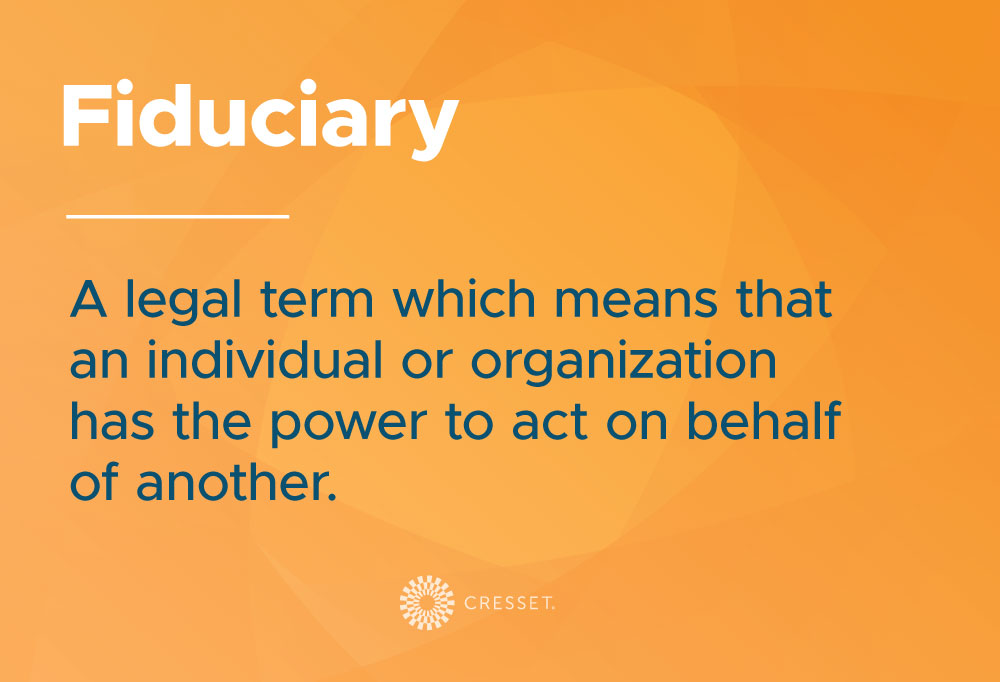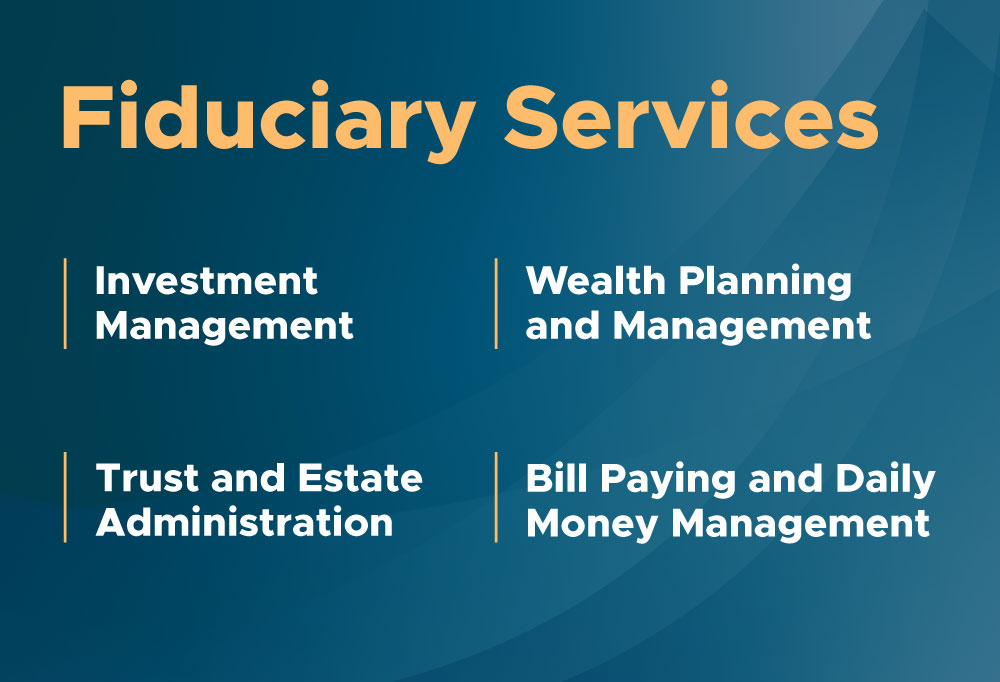Family Office Guide / Private Wealth Management / Fiduciary Financial Advisor
By providing your email address, you consent to receive messages from Cresset regarding our services. View our Privacy Policy.
12 minute read
As a high- or ultra-high-net-worth individual, it is essential to have a trusted financial advisor helping you make the most effective decisions to reach your financial goals. However, not all financial advisors are created equal. While there are many qualifications to look for, the most important is that they are fiduciary financial advisors. Fiduciary financial advisors are held to a higher ethical standard – an important requirement for someone handling your finances and legacy. But what is a fiduciary financial advisor? We’re here to answer that question in full, giving you all the information you need to understand the important distinction between a financial advisor who is held to fiduciary standards, and one who isn’t.
From defining what fiduciary duty is to outlining fiduciary services that are available to you, this guide will take you through the basics and more, so that you are well-equipped to find the right fiduciary financial advisor to help grow and preserve your legacy.
Before we proceed, let’s clarify what it means to be a fiduciary. “Fiduciary” is a legal term which means that an individual or organization has the power to act on behalf of another. With that title comes a great deal of responsibility: when someone accepts the title of “fiduciary,” they are also accepting the legal responsibility to act in the best interests of another person or organization. In the world of finance, that often means managing or investing assets on behalf of someone else and doing so while prioritizing the well-being of the client, not the advisor themself.

If someone identifies as a fiduciary, that means that they have taken on fiduciary duty. “Fiduciary duty” refers to the relationship between the fiduciary and the person or organization they are acting on behalf of. Fiduciary duty can apply to many relationships, including a guardian and their ward, lawyers and their clients, trustees and beneficiaries, and of course, financial advisors and their clients. In each of these cases, the fiduciary would be accepting legal responsibility for duties of care, loyalty, good faith, and confidentiality.
Like other fiduciaries, a fiduciary financial advisor is required by law to act in the best interests of their clients. In the case of a financial advisor, that means recommending financial advice and investments that benefit the client, not the advisor. While they take on the same duties as other fiduciaries, fiduciary financial advisors place particular emphasis on the duties of care and loyalty:
Considering the level of trust we place in our financial advisors, it feels reasonable to assume that all financial advisors would act in the best interests of their clients. Unfortunately, that assumption is not always true and could land you in financial trouble. Not all financial advisors are fiduciaries, and those who are not are under no legal obligation to prioritize your finances above their own. What that might mean in practice is that a financial advisor who is not a fiduciary may not be upfront about hidden fees or commissions. They may even prioritize investments that are only suitable to the client, as opposed to optimal, but benefit the advisor themself.
It is important to note that not all non-fiduciary advisors are dishonest, and many will work with the best interests of their clients in mind. However, they are not legally obligated to do so, so there is no guarantee their practices will live up to your ethical standards. The main difference between a regular financial advisor vs a fiduciary is that a financial advisor who is a fiduciary is required to act in your best interests, including choosing investments that benefit you, regardless of the advisor’s self-interests or the interests of any third parties.
The difference between a fiduciary financial advisor and a non-fiduciary is clear. Bearing in mind the significant role a financial advisor plays in your life, it is worthwhile to find one that you trust, and that you know does not just want to serve your best interests but is also legally obligated to do so. A fiduciary investment advisor will only ever choose investments that align with your goals. Their fiduciary responsibility as a financial advisor requires it. So, if you are still questioning whether you should prioritize finding a fiduciary financial advisor, our answer is a resounding yes.
Consider this hypothetical example in which a financial advisor adheres to their fiduciary responsibility. Charles approaches his fiduciary financial advisor, Amy, because he is planning to retire in ten years and needs advice on how to allocate his investments. Amy finds two options that she could recommend:
As a fiduciary financial advisor, Amy must recommend Option 2 to avoid a conflict of interest and support Charles’s goals. However, a non-fiduciary financial advisor would not be obligated to recommend Option 2, because Option 1 is still suitable for Charles’ needs, even if it is not optimal.

Accepting fiduciary responsibility does not mean that the advisors will not be compensated. What it does mean is that fiduciaries need to be upfront about their fees. An advisor that takes commissions may reasonably give you pause. While fiduciary financial advisors can collect commissions or percentages of assets under management (AUM), fee-only advice is the most transparent, client-forward approach, and the most common model for fiduciaries. The main difference between fiduciaries and non-fiduciaries in terms of compensation is that non-fiduciaries may accept third-party commissions or payments, and fiduciaries are typically paid directly by the client. This model establishes clear lines of communication so the client is aware of how much the advisor is being paid and for what services.
The most direct way to check if someone is a fiduciary is simply to ask them. In fact, we have compiled a list of seven questions to ask any financial advisor, and whether they are a fiduciary is at the top of the list. You can also request a fiduciary oath in writing, which should explicitly state that they are bound by law to act as a fiduciary in all dealings with you.
Another way to tell if a financial advisor is a fiduciary is to examine their fee structure. As discussed above, fiduciaries generally operate using fee-based payment models, so if your potential financial advisor is receiving commissions, that could be a red flag.
Your financial advisor is one of the most significant contributors to your financial health, legacy, and lifestyle. Finding an advisor you can trust is no small feat, but it is worth the effort. At Cresset, we hold ourselves to our True Fiduciary® Standards, which go above and beyond the legal obligation of fiduciary responsibility. Whether you are working with Cresset or any other financial advisor, you deserve transparent communication and for your best interests to be prioritized. Never be afraid to ask questions to make sure your goals align – after all, the relationship you build with your financial advisor can make all the difference for building your future.
If you are curious about Cresset’s True Fiduciary® Standards, or want to discuss how a family office can support your financial future, schedule a founder’s call today. We will answer any questions you might have and do our best to set you up for success.
By providing your email address, you consent to receive messages from Cresset regarding our services. View our Privacy Policy.
Chicago | Atlanta | Austin | Charlotte | Dallas | Denver | Greenwich | Houston | Kalamazoo | Los Angeles | Menlo Park | Minneapolis | Naples | Nashville | New York City | Phoenix | San Francisco | Santa Barbara | Sioux Falls | Tulsa | Washington D.C. | West Palm Beach
Cresset refers to Cresset Capital Management, and all its respective subsidiaries and affiliates. Cresset Asset Management, LLC, also conducts advisory business under the names of Cresset Sports & Entertainment, CH Investment Partners, and Cresset Capital. Cresset provides investment advisory, family office, and other services to individuals, families, and institutional clients. Cresset also provides investment advisory services to investment vehicles investing in private equity, real estate, and other investment opportunities. Cresset Asset Management, LLC is an SEC registered investment advisor. SEC registration does not imply any specific level of skill or training.